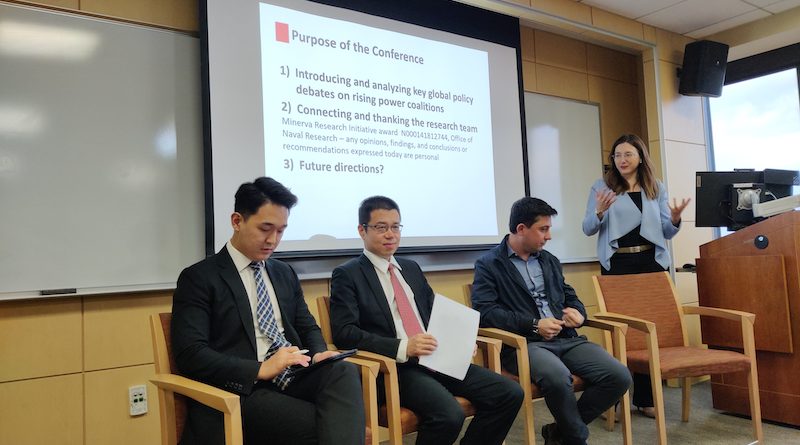Fletcher’s Rising Power Alliances Project Hosts Conference on the BRICS Coalition
By Vishal Manve, MALD 2023 Candidate, The Fletcher School
On December 1 and 2, 2022, BRICS country experts and researchers from the Rising Power Alliances project convened at The Fletcher School for multiple discussions. Led by Professor Mihaela Papa, Rising Power Alliances is a multi-year project that has focused on BRICS countries’ changing alliances and coalitions in the global governance structures. Professor Papa and Academic Dean Kelly Sims Gallagher organized the conference to conclude and disseminate the project’s long-term research, which was funded by the Minerva Research Initiative award from the Office of Naval Research.
Professor Papa said, “As an international negotiation scholar, I have always seen the rise of new powers as a negotiation and coalition-building challenge. My passion for examining BRICS…started when I was a postdoctoral fellow at Harvard twelve years ago and visited Fudan University’s Center for BRICS Studies in Shanghai. Getting the federal Minerva grant to study rising power alliances was amazing–the competition was fierce, and it was an honor both to be selected for the award and to have an opportunity to build a research team at Fletcher.”
“The innovative nature of the project has attracted many post-doctoral candidates, so we could choose the best people and train them here at Fletcher. We have extensively engaged with and interviewed BRICS policymakers and experts during our research to better understand their perspectives,” Papa added. She also spoke about efforts to organize an in-person conference with Academic Dean Gallagher before the Covid-19 pandemic shut down the Tufts campus in 2020.
“We were lucky that we could organize the conference in December 2022 and have many BRICS experts at Fletcher. Since our research team has been operating remotely, the conference was also very special to me because I could meet some of the former postdocs in person after spending many months collaborating with them on joint papers,” Papa said.
Eleanor Hume, a MALD ‘23 who worked with Professor Papa to organize the conference within a short timeline, said, “The project has lasted a total of 5 years and essentially aimed to examine how the BRICS countries view alliances and partnerships. It further examined how they align and diverge across various issue areas both with each other and with the U.S.”
The sessions focused on themes comprising the BRICS countries’ alliances, initiatives, and opportunities in a rapidly changing global political order.
The conference was kickstarted with opening remarks from Academic Dean Kelly Sims Gallagher. It was followed by a keynote address from Jorge Heine, former Ambassador of Chile to China, India, and South Africa and Research Professor at Boston University. Professor Heine highlighted the importance of the BRICS coalition, its defiance of earlier-held assumptions of its failure, and the future expansion of the coalition to further its goals.
The first-panel discussion focused on new bloc politics and featured Dr. Christopher Williams of the University of the Witwatersrand on South Africa’s alignment policy and Dr. Ecaterina Locoman of the University of Pennsylvania on mapping Russia’s close relationships. Dr. Zhen Han of Sacred Heart University also discussed Chinese and Brazilian perspectives on alliances and strategic partnerships, and Dr. Dmitriy Nurullayev of the University of Arizona addressed bloc politics at the UN.
The first panel on day two focused on the BRICS group and Eurasian integration processes. It featured panelists Dr. Zongyuan Zoe Liu from the Council on Foreign Relations, Dr. Fabio de Sa e Silva of the University of Oklahoma, Akshay Mathur of Harvard University and the Center for International Governance Innovation, and Dr. Irina Busygina of Harvard University.
Mathur highlighted the importance of reforming BRICS by working through bilateral strategic issues crucial for the national security of BRICS nations. He discussed his involvement with BRICS presidencies in 2016 and 2021 and his experience working with the G20 in various capacities since 2014.
Mathur also spoke about how BRICS had been written off as “an artificial unnatural grouping.”
Summarizing critiques about the grouping, he said, “It will never work with a political system with different social systems, and was known as the Goldman Sachs gimmick and an advertisement which went too far.”
“It’s not easy, because … there are countries that hold power … and reform will require some countries to give up some of those powers. It is also a matter of who funds the change, and how do we fund some of the global ambitions that these multilateral organizations have. So there are a lot of considerations, none of which can be simplified,” Mathur continued.
Dr. Fabio de Sa e Silva spoke about BRICS under former president of Brazil Jair Bolsanaro and his alliance with Trump. He then shifted the conversation to Brazil’s current leadership under Luiz Inacio Lula da Silva and how that would shape the BRICS future.
“The reason Lula had embraced BRICS in the first two terms was that he sought to give more space to countries other than the U.S. to set the terms of the conversation about crucial issues; it was not ideological. It was more about finding a stage emphasizing global South-South cooperation and expanding Brazil’s soft power,” Silva explained.
Another panel discussion addressed resetting global governance through the development of sustainable policy responses. It included panelists Dr. Chengzhi Yin of Columbia University, Dr. Hyun Ji Rim of the University of Missouri- Kansas City, and Dr. Rishikesh R. Bhandary of Boston University.
On the research outcomes, Professor Papa highlighted how the project was the “first to examine whether BRICS can de-dollarize the global financial system.”
“The study of international institutions has largely focused on formal institutions and alliances. Yet contemporary diplomacy revolves around informal institutions, which remain understudied, and there is a documented neglect of non-Western perspectives. Our project’s publications not only fill these gaps but also advance the geostrategic awareness of the United States at a time of major power tensions,” Papa concluded.

